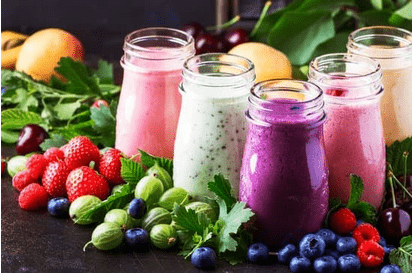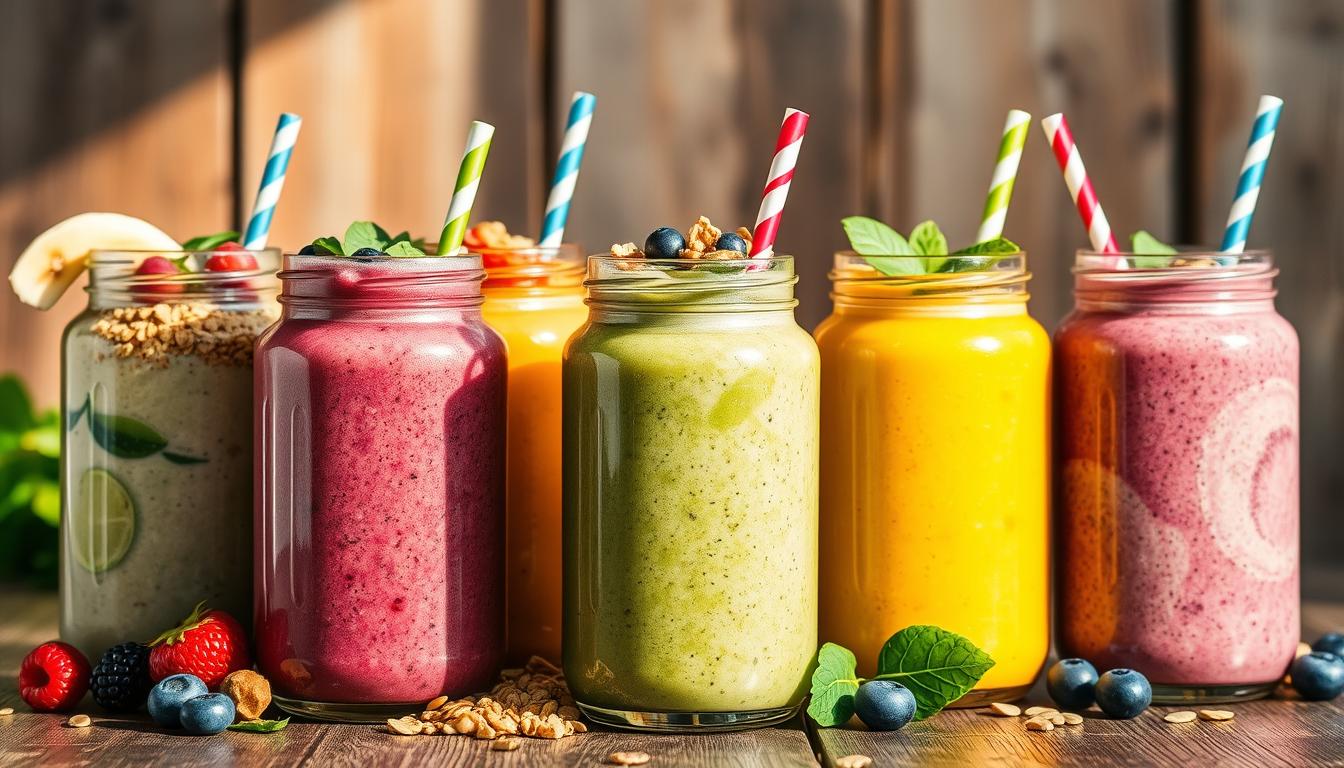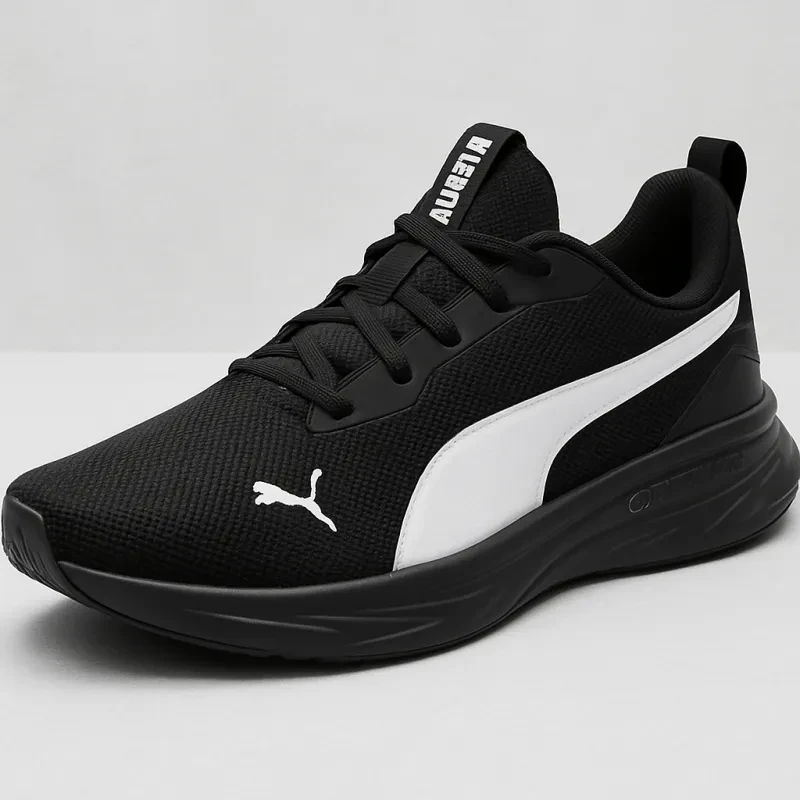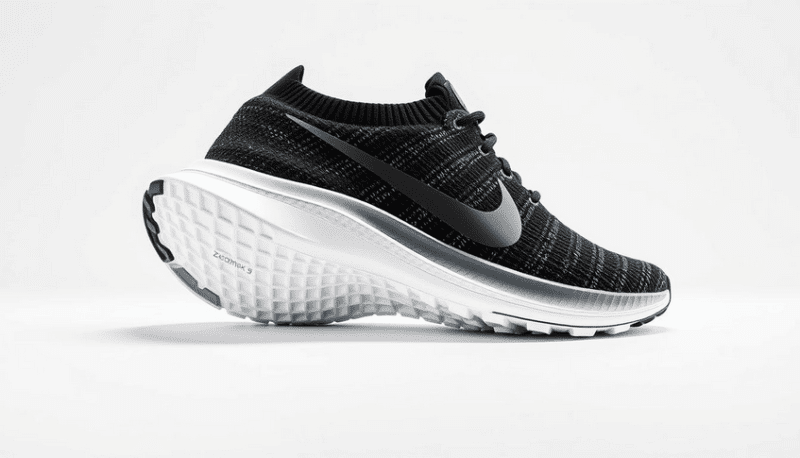As runners, we know how crucial good nutrition is for our workouts and muscle recovery. Protein-packed smoothies are a great way to refill energy and fix muscles after running. They mix carbs and protein well, usually in a 3:1 or 4:1 ratio, to help us recover and rebuild.
These smoothies are especially good for runners who might not feel like eating after a run. This is because their body temperature is high and blood flow is away from their stomach.
Key Takeaways:
- Protein-packed smoothies are essential for post-run recovery, providing a balance of carbs and protein to refuel and rebuild muscle.
- The optimal timing for consuming a recovery smoothie is within 30 minutes of completing a run, when your muscles are primed for repair and growth.
- Protein content in recovery smoothies should be tailored to your individual needs, with the average recommendation being 1 gram of protein per pound of target body weight.
- Incorporating a variety of nutrient-dense ingredients, such as fruits, vegetables, healthy fats, and supplements, can maximize the benefits of your post-run smoothie.
- Avoiding common smoothie-making mistakes, like using excessive ice or overlooking the carb-to-protein ratio, can ensure your recovery smoothie is optimized for maximum effectiveness.
Understanding Post-Run Recovery Nutrition
Refueling your body after a run is key for muscle repair and glycogen replenishment. Your muscles absorb nutrients best in the first 30 minutes to 2 hours after exercise. Knowing the science behind muscle recovery helps you make the perfect smoothie for your fitness goals.
Why Timing Matters for Recovery
Running depletes your muscles' glycogen stores. Soon after, eating carbs and protein helps restore glycogen and repair muscles. Research shows carbs are essential for muscle recovery and performance. Athletes need 0.5 to 2 grams of carbs per kilogram of body weight post-workout.
The Science Behind Muscle Recovery
Intense exercise causes muscle damage and inflammation. Whey protein smoothies or vegan protein smoothies provide the necessary building blocks for muscle repair. Studies find that a large carb intake post-workout is more effective than smaller amounts.
Key Nutrients for Runners
Runners also need to replenish fluids and electrolytes lost in sweat. Antioxidant-rich foods help combat oxidative stress. High-protein recovery beverages with spinach, berries, and bananas meet these needs. Having a fitness smoothie recipe ready helps refuel after a workout.
https://youtube.com/watch?v=-NM7p5HgUrg
"Immediate post-run nutrition is crucial for replenishing glycogen, supporting muscle repair, and promoting overall recovery and performance."
The Perfect Carb-to-Protein Ratio for Recovery Smoothies
Creating the ultimate post-run recovery smoothie means finding the right mix of carbs and protein. The ideal ratio is either 3:1 or 4:1. This balance helps your body quickly rebuild muscle glycogen, speeding up recovery.
Too much protein can slow down digestion and hinder carb absorption. So, it's important to keep the ratio just right. This ensures your body gets the nutrients it needs to recover fast and be ready for your next run.
- The 3:1 or 4:1 carb-to-protein ratio provides the necessary nutrients for muscle repair and replenishment after a challenging run.
- Consuming a recovery smoothie within 30 to 45 minutes after your workout helps rapidly refuel your energy stores.
- Ingredients like bananas, pineapple, and coconut water offer easily digestible carbohydrates and electrolytes to aid in hydration and recovery.
- Adding high-quality protein sources, such as whey or plant-based powders, helps rebuild and repair muscle tissue.
Making the perfect post-run recovery smoothie with the right carb-to-protein ratio is key. It leads to faster muscle recovery and better performance for your next run. Fuel your body well and see your running skills improve.
Essential Ingredients for Recovery Smoothies
Fueling your body with the right nutrients is key for a good post-run recovery. We aim to make the ultimate recovery smoothie with high-quality protein, complex carbs, and essential vitamins and minerals. Let's look at the ingredients that can help you recover stronger than before.
Power-Packed Protein Sources
Protein is vital for fixing and building muscle after a tough workout. Choose plant-based protein sources like plant-based protein powder, kale (with 4 grams of protein per serving), or chia seeds for a protein boost. Dairy-based proteins, such as Greek yogurt, are also great options.
Best Fruits for Recovery
- Bananas offer easy-to-digest carbs and key electrolytes like potassium to replace what's lost during exercise.
- Berries, especially blueberries, are low in sugar and full of antioxidants. They help reduce inflammation and boost the immune system.
- Pineapple is a natural source of bromelain, which may help with muscle recovery.
Beneficial Add-ins and Supplements
To enhance your recovery smoothie, add these powerful ingredients:
- Coconut water for electrolytes and easy-to-absorb carbs
- Matcha green tea for a natural energy lift
- Inulin to support gut health
- Maca for its energizing and adaptogenic qualities
- Ginger and turmeric for their anti-inflammatory effects
By mixing these nutrient-rich ingredients, you can make plant-based protein smoothies, high-protein smoothie recipes, and vegan recovery smoothies. These will leave you feeling energized and ready for your next workout.
Top Post-Run Recovery Smoothie Recipes
Choosing the right smoothie after a run can really help us recover. These smoothies are full of nutrients that help fix muscles and replenish energy. Let's look at some tasty recipes that are great for runners' diets, endurance training nutrition, and refueling after exercise.
The Protein Pack smoothie is a real winner. It has frozen banana, berries, milk, Greek yogurt, spinach, almond butter, and chocolate whey protein powder. It's packed with 14 grams of fat, 33 grams of carbs, and 34 grams of protein. It's perfect for athletic recovery shakes.
The Re-hydrator smoothie is a cool choice. It's made with watermelon, Greek yogurt, and coconut water. It has 0.5 grams of fat, 35 grams of carbs, and 1 gram of protein. This smoothie is great for getting back fluids and electrolytes lost during hard workouts.
The Go Go Green smoothie is full of greens. It mixes banana, spinach, almond milk, Greek yogurt, and chia seeds. It has 18 grams of fat, 51 grams of carbs, and 12 grams of protein. This smoothie is great for muscle recovery and endurance.
| Smoothie | Total Fat (g) | Carbohydrates (g) | Protein (g) |
|---|---|---|---|
| Protein Pack | 14 | 33 | 34 |
| Re-hydrator | 0.5 | 35 | 1 |
| Go Go Green | 18 | 51 | 12 |
These are just a few examples of tasty post-run recovery smoothie recipes. They support our runner's diet, endurance training nutrition, and muscle repair after a tough workout. By mixing the right carbs, protein, and nutrients, we can recover better and feel stronger than ever.
Pre-Run vs Post-Run Smoothie Components
Timing and ingredients are key for running recovery smoothies. They affect how well your body recovers. Let's look at the differences between pre-run and post-run smoothies.
Timing Your Smoothie Intake
Pre-run smoothies should be 1-2 hours before running. They need quick carbs and water for energy and electrolytes. Post-run smoothies, eaten within 30 minutes, help absorb nutrients and start muscle repair.
Adjusting Ingredients Based on Workout Intensity
Workout intensity affects your smoothie ingredients. For tough, long runs, add more carbs and protein for energy and muscle repair. Short, easy runs might need more healthy fats and fiber for recovery.
| Workout Intensity | Pre-Run Smoothie Components | Post-Run Smoothie Components |
|---|---|---|
| Light/Moderate |
|
|
| Intense/Long-Distance |
|
|
Knowing the roles of pre-run and post-run smoothies helps you make the best recovery drinks. This way, you can meet your training needs and improve performance and muscle recovery.
Common Smoothie Making Mistakes to Avoid
As passionate runners, we know how key it is to replenish nutrients after our workouts. Smoothies are a great way to refuel, but we must avoid common mistakes. This ensures we get the most out of our post-run smoothies.
One mistake is using too much fruit, which can lead to too much sugar. We suggest balancing fruits, leafy greens, and protein-rich ingredients like Greek yogurt or nut butters. This balance is crucial for muscle replenishment and supports our high-protein needs.
Another error is forgetting to add healthy fats like avocado or chia seeds. These ingredients make our smoothies creamy and help our body absorb vitamins. They're essential for our recovery as endurance athletes.
Lastly, we should avoid using fruit juices as our smoothie base. Fruit juices often have added sugars that can harm our balanced nutrition goals. Instead, choose unsweetened plant-based milks or coconut water. They provide the hydration and electrolytes we need to refuel effectively.
FAQ
Q: Why are post-run recovery smoothies essential for runners?
A: Post-run recovery smoothies help runners refill their energy and fix muscles. They mix carbs and protein in a 3:1 or 4:1 ratio. This is important because runners might not feel hungry after running due to high body temperature and less blood flow to the stomach.
Q: When is the best time to consume a post-run recovery smoothie?
A: The best time to have a recovery smoothie is within 30 minutes after running. This is when muscles can best rebuild glycogen. It's the perfect time to get the carbs, protein, and electrolytes lost through sweat back into your body.
Q: What is the ideal carb-to-protein ratio for post-run recovery smoothies?
A: The best ratio for post-run smoothies is 3:1 or 4:1 carbs to protein. This mix helps muscles rebuild glycogen better than carbs alone. Too much protein can slow down digestion, so finding the right balance is key for recovery.
Q: What are the essential ingredients for a recovery smoothie?
A: Key ingredients include coconut water for electrolytes and carbs, bananas for carbs and potassium, and berries for antioxidants. Yogurt or protein powder help with muscle repair, and peanut butter adds healthy fats and keeps you full. Matcha, inulin, maca, ginger, and turmeric are also good add-ins.
Q: Can you provide some example post-run recovery smoothie recipes?
A: Sure, here are some recipes. A basic smoothie has frozen banana, berries, milk, Greek yogurt, spinach, almond butter, and seeds. A chocolate peanut butter smoothie has banana, almond milk, Greek yogurt, peanut butter, and chocolate protein powder. A watermelon smoothie uses watermelon, Greek yogurt, and coconut water.
Q: How do pre-run and post-run smoothie components differ?
A: Pre-run smoothies are for 1-2 hours before running and focus on quick carbs and hydration. Post-run smoothies have more fat and fiber and should be eaten within 30 minutes after running. Adjust ingredients based on how hard you ran, with longer runs needing more carbs and protein.
Q: What are some common mistakes to avoid when making recovery smoothies?
A: Avoid using too much fruit for too much sugar, not enough protein, and forgetting healthy fats. Don't use fruit juices as a base because of their sugar. Balance your ingredients and keep the carb-to-protein ratio right for effective recovery smoothies.
DISCLAIMER
The information contained on Save on Sneaks and our related pages is provided for entertainment and informational purposes only. It is not intended as a substitute for the advice of or treatment that may be prescribed by your physician or other health care provider.
Understand that you are solely responsible for the way this information is perceived and utilized, and do so at your own risk. In no way will Save on Sneaks be responsible for injuries or other problems that might occur due to the use of this website or any actions taken based on the content of this website. Save on Sneaks will not be held responsible for the conduct of any companies and web sites recommended within this site.
Before adhering to any of the information or recommendations or undertaking any exercise program or diet regimen, you should consult your physician.




